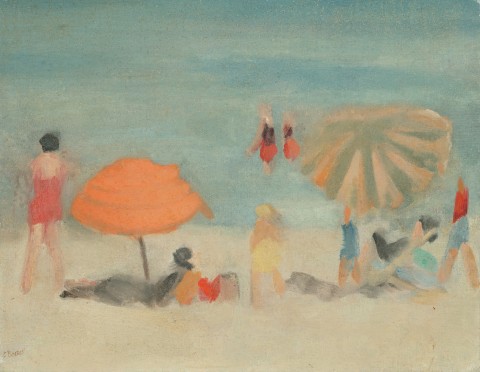BEACH SCENE, c.1932 – 33
CLARICE BECKETT
oil on canvas
35.0 x 45.0 cm
signed lower left: C. Beckett
Private collection, Melbourne
Christie’s, Melbourne, 9 April 1991, lot 177
Joseph Brown Gallery, Melbourne, acquired from the above
The Cbus Collection of Australian Art, Melbourne, acquired from the above on 22 April 1991
The Bus Collection of Australian Art, Wollongong City Gallery, New South Wales, 16 March – 12 April 1992, cat. 54
A Century of Australian Art, Gosford Regional Gallery, New South Wales, 14 April – 28 July 2000
A New World, Latrobe Regional Gallery, Victoria, 1 May – 30 August 2009
Figurative Works from the Cbus Collection, Latrobe Regional Gallery, Victoria, 4 August – 2 December 2012
The Ordinary Instant, Bayside Arts & Cultural Centre, Melbourne, 22 July – 11 September 2016
Clarice Beckett: The Present Moment, Art Gallery of South Australia, Adelaide, 27 February – 23 May 2021
on long term loan to Wollongong City Gallery, New South Wales (label attached verso)
Lock, T., Clarice Beckett: The Present Moment, Art Gallery of South Australia, Adelaide, 2021, pp. 149 (illus.), 195 (illus.)
Nainby, B., Stanhope, Z., and Furlonger, K., The Cbus Collection of Australian Art, in association with Latrobe Regional Gallery, Melbourne, 2009, pp. 18, 57 (illus.), 238
In Beach scene, c.1932 – 33, Clarice Beckett gives us a perfect and familiar scene of Melbourne bayside leisure as played out in the shallows of Port Phillip Bay. These mostly calm waters provide a languid experience for swimmers, and for children who find their own teasures as they investigate the waters and nearby rock pools. Beckett lived nearby and was an avid bather, taking a dip every morning before returning to the necessary domestic duties that were now, in the early 1930s, making major intrusions on her ability to find time for painting.
Beckett was at the forefront of Australian modernism in these years, in spite being almost forgotten in the decades after her death; thankfully, the forensic research done since the early 1970s by gallerist-historian Rosalind Hollinrake has seen this neglect overturned. Beckett’s art was based on rigorous training at the National Gallery School and followed by nine months with the ‘Tonalist’ painter Max Meldrum. There is a softness inherent in paintings which adhere to Meldrum’s theories as the emphasis is placed on tone and proportion, underscored by a rejection of preliminary sketching and hard lines. Beckett’s genius was to take these ideas further and the comprehensive exhibition Clarice Beckett: The present moment held at the Art Gallery of South Australia in 2021 opened many people’s eyes to her achievement in this regard. Beckett’s bayside paintings such as Beach scene possess an intimate modesty where no single figure appears to be posing or even inferring anything greater than a personal absorption in their own private activities. It is Beckett’s paint application, composition and technique that she wished to be at the forefront, as much as the subject itself; she sought to ‘give a sincere and truthful representation of a portion of the beauty of Nature, and to show the charm of light and shade.’1
Beckett’s paintings are evocative, poetic ruminations on the world around her, and companion works to Beach scene include Sandringham beach, c.1933, and Yachts in the Bay, c.1933 (both in the collection of the National Gallery of Australia); and Beach scene, 1932, The red sunshade, 1932, and Bathing boxes, Brighton, 1933 (all in the collection of the Art Gallery of South Australia).
1. Beckett, (catalogue entry), Twenty Melbourne painters: 6th annual exhibition, Atheneum Gallery, Melbourne, 1924
ANDREW GAYNOR
